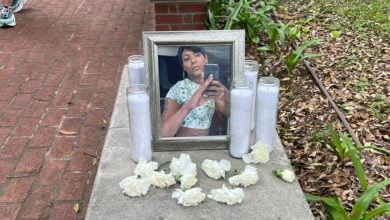In the historic San Antonio Westside, a grassroots coalition of community organizations called Pueblo Over Profit has been fighting to stop a local gentrification project they are calling “the Scobey scam.” Obscenely, the city’s local public transit entity, VIA Transit, actually hopes to use public dollars to fund this collaboration with private developer DreamOn.
Being billed as a “transit-oriented community,” VIA’s Scobey Complex Redevelopment Project would be a mixed-use, mixed-income complex that contributes to the growing forces of gentrification in one of the most impoverished zip codes in the state. The city hopes to expand “revitalization” of downtown San Antonio, but residents know this term and the other jargon well. It means they intend to turn the area into a cyber tech-military-tourist magnet for wealthy visitors while forcing working-class Latino and Mexican residents to the margins.
Developers’ version of ‘affordable’ housing is a lie
The “Scobey scam” hinges on a bait-and-switch that working-class people across the country know all too well: Propose a “mixed-use development,” promise a small number of “affordable” units that most residents can’t actually afford, then provide no additional support for the displaced people.
The Scobey project proposes over 100 apartment units misleadingly labeled as “affordable” with rents made for household incomes of $50,000-$150,000, by the project’s own metrics. The median household income of the historic Westside is below $27,000, and Westside is home to one of the oldest and largest public housing complexes in the country. The Scobey plan would put the entire neighborhood at risk.
Public dollars are going toward these pricey “affordable” apartments, effectively using tax dollars to subsidize gentrification! Residents badly need upgrades and expansions to public housing, but this demand is being replaced with the market-based model and the catch-all phrase of “affordable” housing. A large portion of high-end apartment complexes in the poorest areas of San Antonio have been publicly subsidized with massive tax subsidies and city funds, draining public pockets for private capital gains.
Scobey is just one piece of a collaborative public-private push to legitimize gentrification projects via the use of public dollars, non-profits and local developers. Westside resident and Pueblo Over Profit coalition organizer Luissana Santibañez told Liberation News, “The only way that we can prevent this fraud from taking place is by organizing to stop this publicly funded gentrification project and exposing this scam!”
San Antonio’s housing crisis
San Antonio’s housing crisis is deepening. Over 95,000 families are on the waitlist for low-income housing. This number was less than 40,000 (which was already obscene) prior to the pandemic. Over half of these households make less than $21,000 and include many disabled and elderly people. The city has lost 1,700 public housing units since 2000, including two whole complexes that were completely destroyed and turned into mixed-income apartments.
During the pandemic, corporate landlords increased ownership of single-family homes in San Antonio by over 40%, and outside investors bought millions in equity of local housing. Building more “mixed-use developments” or just more housing units in general and assuming this will solve the problem is wrong.
Party for Socialism and Liberation and POP organizer Sky Lenaghan explained to Liberation News: “Instead of building something similar to the Pearl, an unjustifiably expensive and exclusive gentrification project, the Scobey complex could strive to actually serve the community instead of attracting tourism and revenue for big businesses … This could be a monumental moment for housing in San Antonio if VIA would listen to the concerns and demands of the people.”
Scobey for the People: San Antonio residents fight back
POP was formed by organizers with PSL, the Esperanza Peace and Justice Center, the Historic Westside Resident Association and other community organizations.
In March and April, organizers began meeting weekly to inform the public and hear from Westside tenants and residents. The group started distributing flyers and posting social media content to promote a rally outside of a Scobey development open house and a VIA Board Meeting in May. Coalition members went door-to-door in adjacent neighborhoods to collect petition signatures against the proposal, including at local events.
In May, the rally outside of the VIA took place. The coalition met the VIA meeting with speeches, chants, and signs in a strong show of community force to push back against the false narrative that they were pushing. Since then, Pueblo Over Profit has been a strong force at the monthly VIA Board Meetings with spirited public comments and placards.
In the following two months, community meetings were held that focused on consolidating and cementing the “Scobey for the People Plan.” Organizers planned strategies for how to engage and educate more local residents via community events and continue disrupting the project. The coalition organized a successful community event called “Scobey for the People Block Party” in July.
In September, VIA and DreamOn hosted an invite-only “community meeting.” Despite paid consultants’ attempts to control the meeting’s agenda, Pueblo Over Profit was able to control the narrative and push back against the gentrification agenda.
The coalition then held “Scobey para la gente: Noche de Lotería,” a community event with games, discussion, prizes, music, and food at a popular Westside venue to educate more people about the struggle.
The struggle has continued advancing as POP has even held meetings with VIA board members and local housing authorities. Organizers are seeking to gain more information about the developer’s plans, ways to stop it, and leverage points. Despite DreamOn’s attempts to undermine the resistance, Scobey will be for the people.




